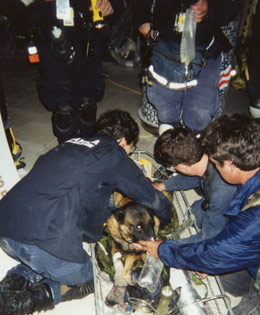

It has been five years since the disasters of September 11, 2001 . Since that time, Cynthia Otto, DVM, PhD, has been tracking the health and behavior of the search and rescue dogs deployed during that tragic period. Dr. Otto is a member of Pennsylvania 's Task Force 1 (PA-TF1), a FEMA-mandated urban search and rescue team. She deployed along with the search and rescue dog handlers of PA-TF1 to the World Trade Center for 9 days. She experienced first-hand the risks that both humans and animals faced during the recovery effort.
Now, five years later, Dr. Otto optimistically reports that the search and rescue dogs that were deployed at the disaster sites have not suffered measurable health effects. Although a recent study of human rescue workers at the World Trade Center revealed an increased incidence of respiratory issues, similar problems have not been observed in the search and rescue dogs. There are a couple of possible reasons for this finding. First, human workers who were on site during the collapse were more severely affected, but the dogs in this study were coming from all over the country and the majority didn't reach the disaster site until at least the day after the collapse. Second, there are species differences that may have had a protective effect for the deployed dogs. Asthma is very uncommon in dogs, so they are less likely to experience the types of reactive airway disease affecting the human responders. In addition, dogs' nasal passages are much longer than a human's, perhaps helping to filter out more of the particulate matter. The study is ongoing though and a major objective is to determine the long-term effects, respiratory or otherwise.